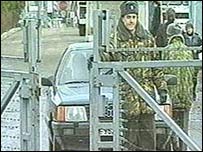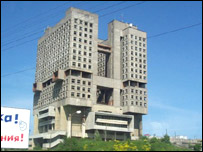|
By Steven Paulikas
BBC News, Kaliningrad
|

Kaliningrad has suffered more than a decade of neglect due to its isolation from the main body of Russia. As the country's only ice-free European port, it remains strategically important to Moscow. Yet local residents are beginning to demand the sort of lifestyle they see in neighbouring countries.

Kaliningrad, the Russian enclave, has become increasingly isolated
|
Kaliningrad is something of a regional court jester, a dysfunctional bit of land so tragic it is actually comical in the eyes of its European neighbours.
The Soviet Union annexed this former German territory on the south-eastern shores of the Baltic Sea after World War II.
An extensive campaign was immediately waged to erase the Teutonic mark left on the region.
German inhabitants were expelled and replaced with Russian settlers. Towns like Tilsit and Rauschen were renamed Sovetsk and Svetlogorsk.
Finally, Koenigsberg, the 700-year-old regional capital that gave birth to the great philosopher Emmanuel Kant was dubbed Kaliningrad.
I witnessed evidence of this schizophrenic history in an antiques shop where Nazi-era china sets embossed with swastikas were displayed alongside busts of Lenin and Stalin.
Decline
When the iron curtain lifted, the geographical links that connected Kaliningrad to the rest of Russia disappeared.
Kaliningraders are cut off from "Great Russia", as they call it, by at least two other countries no matter which way they travel.
The logistical complexity of staying tied to Russia has led to economic and social decline. Unemployment is rampant and the region has one of Europe's highest HIV infection rates.
 |
 Unemployment is rampant and the region has one of Europe's highest HIV infection rates
Unemployment is rampant and the region has one of Europe's highest HIV infection rates

|
One of the few positive developments is an increase in environmental quality, but that is only because the old, polluting factories have mostly gone bankrupt.
My first impression of the region was on the border last summer, when a group of guards barked at me to show my "ugly mug". It did not get much better from there.
The little economic activity that exists in the rural regions looks post-apocalyptic.
Crumbling red brick houses left behind by German farmers are surrounded by Soviet-style collective farms that barely creak along.
'Russia's resort'
In one village, I trod over poor, sandy soil to approach a shirtless man sitting on a pile of crumbling bricks whilst mending an ancient scythe.
Seeing I was a foreigner, he greeted me with words too obscene to be repeated and threatened me with his broken farming implement.
 |
 Locals told me of a beach no one visits because it is still strewn with the skeletons of soldiers from the Second World War
Locals told me of a beach no one visits because it is still strewn with the skeletons of soldiers from the Second World War

|
Later, I met men calling themselves "fishermen" whose business consisted of pulling a few carp out of a nearby waterway and trading them for vodka.
A villager recounted their daily schedule. Get up around noon to begin fishing, find someone willing to trade vodka for their catch, get drunk, and return to the abandoned house where they squat.
Efforts have been made to develop tourism.
A banner greeting visitors to the seaside town of Zelenogradsk ambitiously calls it "Russia's resort", but I was most struck by the beach promenade with its row of German houses now burnt down and littered with used hypodermic needles.
The region's natural beauty should be a draw, but locals told me of a beach no-one visits because it is still strewn with the skeletons of soldiers from WWII, and a forest of lead trees pumped full of ammunition during the fighting six decades ago.
Some, though, are putting the region's history to use.
I visited a countryside villa lavishly restored by a wealthy Muscovite family.
The only strange thing being that it once belonged to Hermann Goering, the Nazi commander of the Luftwaffe and Hitler's hand-picked successor.
The exclave's isolation became even starker when neighbouring Lithuania and Poland joined the EU last May.
While these countries get richer and more democratic by the day, the sad port ruled by their former occupiers seems to be slowly sinking into the Baltic Sea.
Future
I decided to go back this month to see how being an island of Russia surrounded by EU territory had changed the place.
While I returned with certain preconceptions, what I found in the city of Kaliningrad itself was something very different - a group of people committed to determining their own future while leaving the horrors of the past behind.
According to politicians, businessmen and academics, the dire state of the countryside is understandable considering that their little patch of land has been forgotten by the rest of the world, and even their own country.

Kaliningrad's isolation has led to economic and social decline
|
At a press conference last year in Moscow, Russian President Vladimir Putin actually had to point to Kaliningrad on a map to show Russian journalists where it was.
I was presented with mountains of evidence that Moscow has no plan for Kaliningrad, and has not had one for the last 14 years.
As a result, residents fed up with their uncertain fate have come up with various bold demands of their own.
Few believe Moscow will give up its grip on the territory that easily.
But many residents argue their exclave is inevitably sliding towards Europe and away from Russia.
Recent polls show youngsters are twice as likely to have visited the EU than Russia proper.
If that current trend persists, the economic and political fences erected around Kaliningrad may in time disintegrate into a hollow facade, propped up by a distant and disinterested national capital.
From Our Own Correspondent was broadcast on Saturday, 26 March, 2005, at 1130 GMT on BBC Radio 4. Please check the programme schedules for World Service transmission times.
